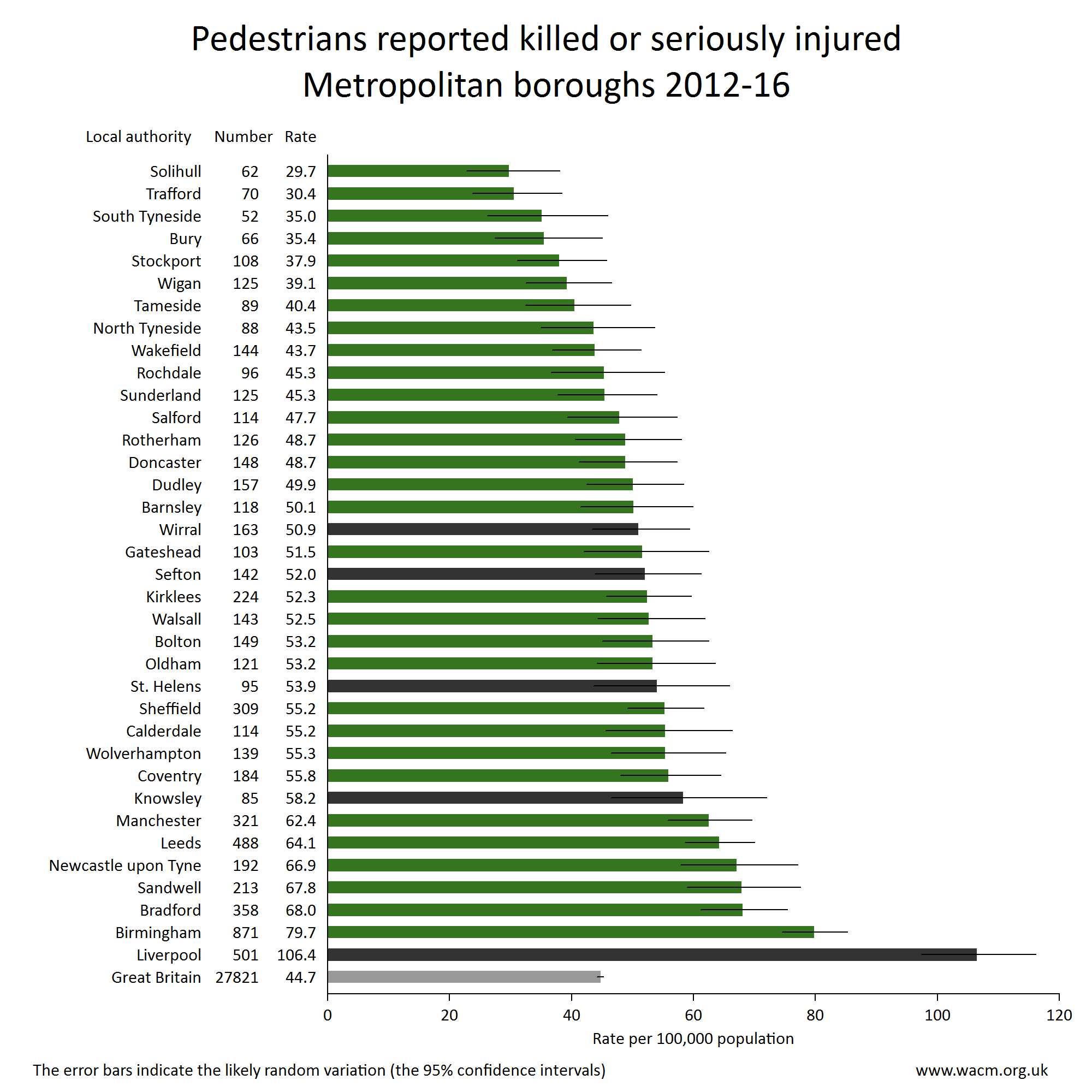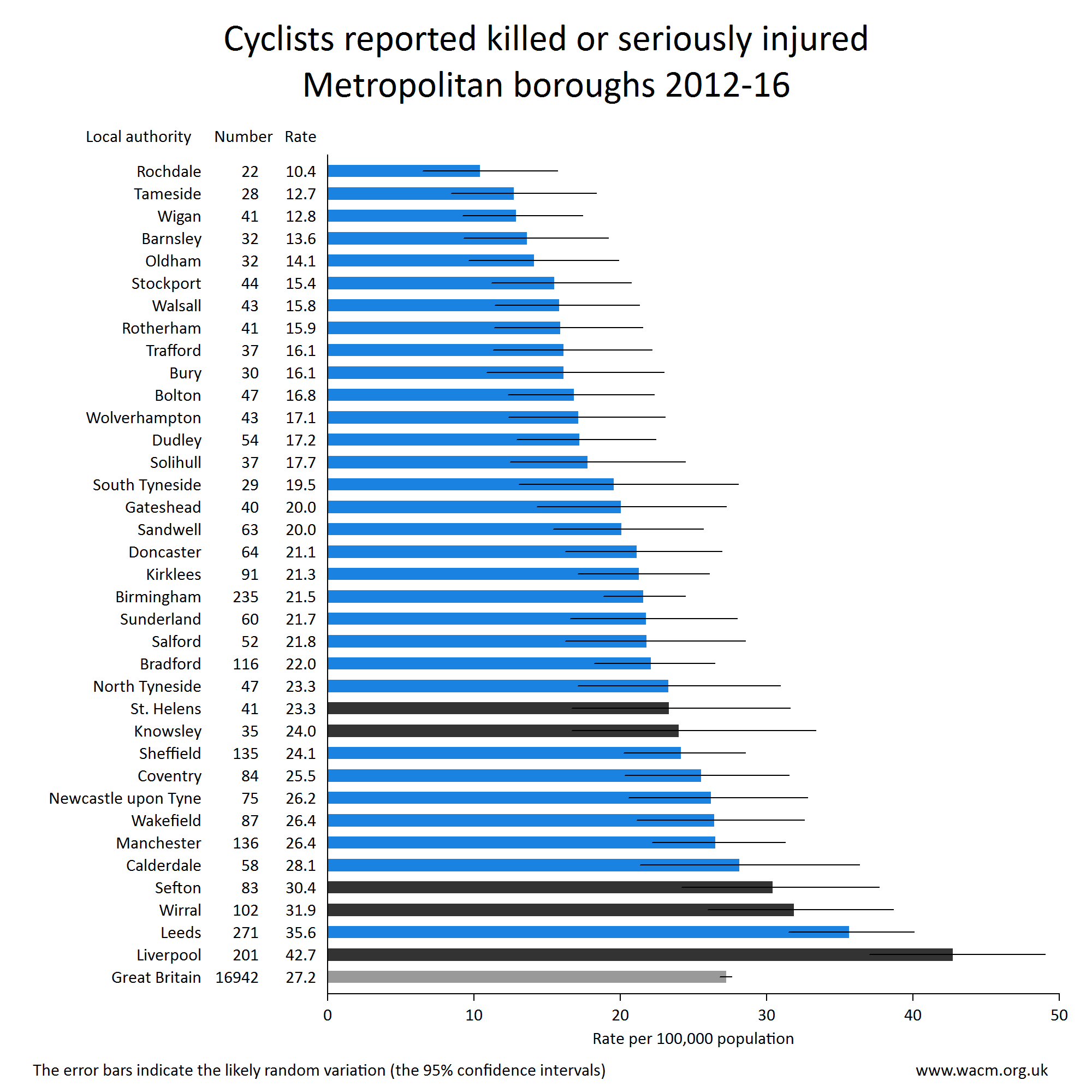Home page
A protest campaign over poor walking and cycling safety
- Children are being harmed on Merseyside's roads: Who's responsible?
- Why a protest campaign is needed
- Civil disobedience and road safety: Q and A
Effective road safety planning: what should be happening
What the vision should be- A road safety vision
- Walking safely is a basic human right
- Declaration of every child's right to safe and healthy streets
- Decision making in a democracy: 7 Principles of Public Life
- Effective road safety planning
- What constitutes proper consultation
- Public bodies should avoid 'The patronising disposition of unaccountable power': the Hillsborough Report by the Right Reverend James Jones
- Merseyside road casualties - summary
- Merseyside road casualty maps
- Merseyside pedestrian casualties: the worst in Great Britain
- Merseyside child pedestrian casualties: the third worst in Great Britain
- Liverpool pedestrian casualties: the worst metropolitan borough
- Merseyside cyclist casualties: bottom third position
- Merseyside child cyclist casualties: the fifth worst in Great Britain
- Cyclist casualties: Liverpool is the worst metropolitan borough
- Motorcyclist casualties: Merseyside is the worst metropolitan area
- Motorcyclist casualties: The Wirral is the second worst metropolitan borough
- Car occupant casualties in Merseyside
- Total (all modes) road casualties: Merseyside is the worst metropolitan area
- Total (all modes) road casualties: Liverpool is the third worst metropolitan borough
- Pavement parking: Questions and answers
- Childhood obesity levels in Merseyside
- Deaths from air pollution in Merseyside
Options that should be considered
- Best practice options: policy documents
- Best practice options: Safe System approach to road safety
- Best practice options: 20mph speed limits
- Best practice options: 20mph speed limits: Pedestrian fatality risk and impact speed
- Best practice options: 20mph speed limits: Recommendations
- Best practice options: cycling infrastructure
- Best practice options: actions by police forces against illegal pavement parking
- Best practice options: regulated (permitted) pavement parking
Merseyside road safety failures
- Why children are suffering so much harm from the danger on Merseyside's roads
- Liverpool City Region Road Safety Strategy 2017-2020
- Liverpool City Region Local Journeys Strategy
- Liverpool Council never completed its Inquiry into poor road casualty figures
- Liverpool Council: Appalling cycling infrastructure
- Wirral Council road safety malpractice
- Wirral Council's failing road safety scrutiny committee
- Merseyside Police: failure of public engagement: a case history
- Improvements needed from Merseyside Police
- Why are road safety volunteers having so little effect?
Merseyside / national road safety failures
- How changes in the Highway Code caused the pavement parking confusion
- Why the Living Streets / Guide Dogs pavement parking campaign is inept and dangerous
- Flawed DfT "Consultation" on pavement parking
- Two child pedestrian deaths from pavement parking
- The 2018 Atkins/AECOM/Mayer 20mph Research Study was seriously flawed
Merseyside road safety concerns
So-Mo project on pedestrian casualties- So-Mo project outline
- So-mo project to reduce pedestrians killed or seriously injured on Liverpool's roads: Concerns and questions
- So-Mo meeting on 16th March 2018: Response by Liverpool Pedestrians Association
- So-Mo reports of May 2018: Response by Liverpool Pedestrians Association
Merseyside road safety improvements
- Merseyside Police and Crime Plan 2017 - 2021
- Merseyside Police leading the way in tackling pavement parking
Taking action on poor road safety
Current campaigns
- Voluntary groups
- Vision Zero Merseyside 2013
- Letter to Jane Kennedy and Steve Rotheram re LCR road safety strategy
- Letter to Jane Kennedy and Steve Rotheram: Replies from Jane Kennedy, Steve Rotheram and Sean Traynor
- Meeting notes: Merseyside Road Safety Partnership with Liverpool Pedestrians Association, 27 March 2018
Newsletters
- Newsletters: contents
- Newsletter - August 2018
- Newsletter - 16 December 2017
- Newsletter - 23 November 2017
- Newsletter - 2 November 2017
News
- PCC Scrutiny Group meeting 5 December 2017 - Provisional
- Highlights of the 9th 20mph conference in Birmingham, 8 March 2017
- Merseyside Police Performance and Scrutiny Group meeting of 2 March 2017
About
Contact
Newsletter - 23 November 2017
Liverpool worst for pedestrian and cyclist casualties

Liverpool is by some way the worst metropolitan borough.



These figures come from an analysis of the latest road casualty data released by the Department for Transport.
Liverpool's poor position
Liverpool is not just the worst of the English metropolitan boroughs - it is the worst by some way. The reasons for this are not clear. They might be clear if Liverpool City Council had completed its Scrutiny Inquiry into its poor casualty figures. The Inquiry was announced in 2014, and took evidence at a number of hearings, but it never produced a final report - see wacm.org.uk/27.html. This suggests some fundamental cultural problems within Liverpool City Council.
Merseyside Police improvements needed
Three members of Merseyside voluntary groups recently met Jane Kennedy, Merseyside Police and Crime Commissioner, and discussed concerns about the new regional road safety strategy. Whilst the vision of zero deaths and the interim target reduction are good, many are concerned that the measures included in the strategy will achieve little.
Jane Kennedy was pressed:
- to review the Merseyside Police guidelines on enforcement of 20mph speed limits - these refer to obsolete national guidance - see wacm.org.uk/56.html
- to stop Merseyside Police vehicles being parked illegally on pavements (driving on to a pavement to park is an offence except in an emergency or where signs permit it). This has continued despite the death of a child in Neston, who was killed when a delivery van was driven on to a pavement to park, when she was on her scooter on the way to her playgroup - see here
- to increase the use of Twitter by Merseyside Police, particularly for road safety messages, along the lines of West Midlands Police.
Sign up for future newsletters
Sign up for future newsletters via this link
Previous newsletter
See Newsletter - 2 November 2017
Last updated: 21 May 2018

